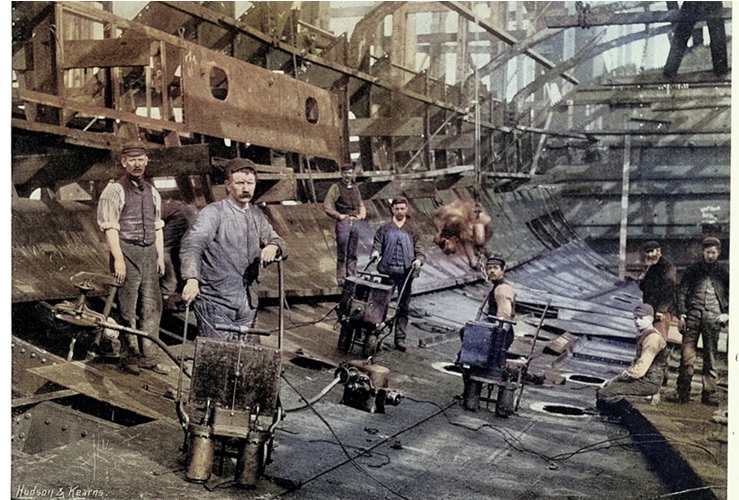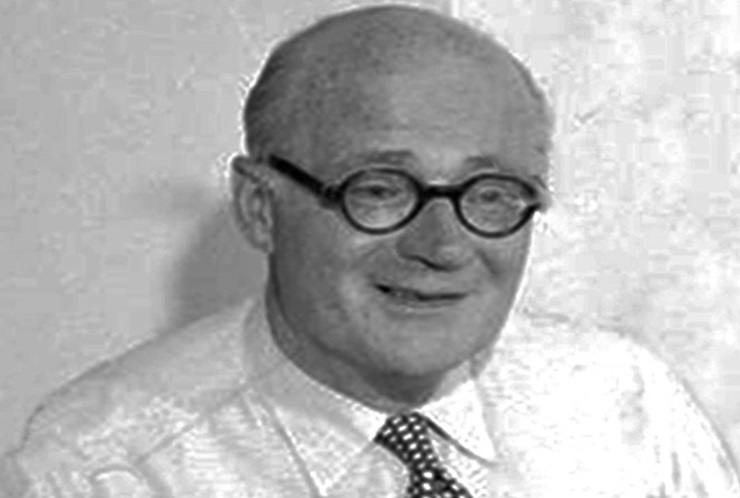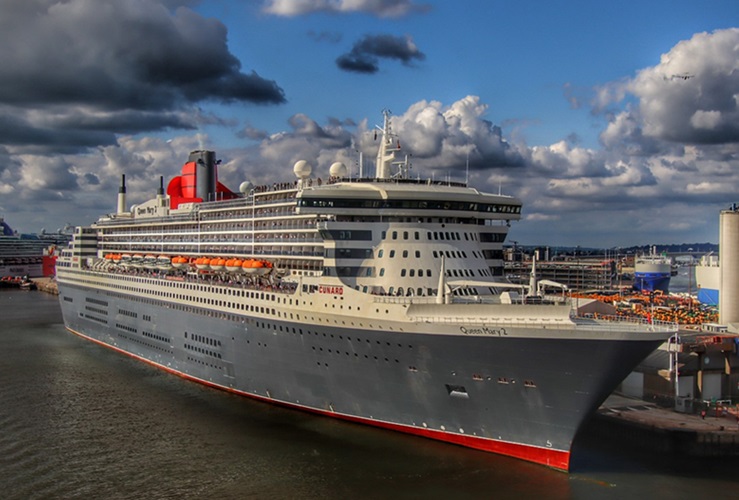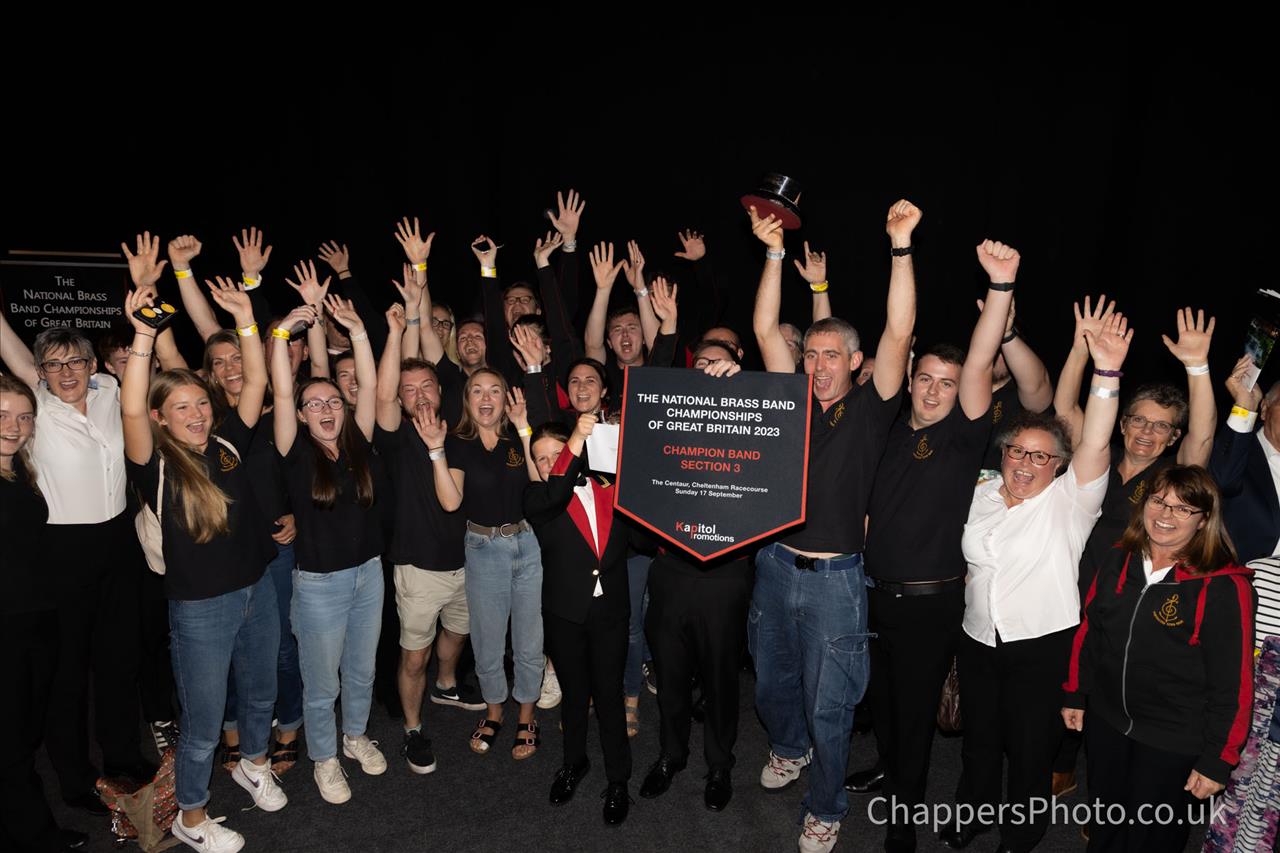
When Peter Yorke wrote ‘The Shipbuilders’ in 1960, Britain still ruled the waves in constructing the leviathans of ocean commerce and warfare.
By the end of the 20th century it was a fraction of its former size, the yards that once teamed with industry, silent and rusting.
Worldwide competition, outdated technology and demarcation disputes crippled the industry. The rise of the container ship and the decline in trans-oceanic travel saw famous names disappear along the great rivers of the UK – John Brown, Charles Connell and Upper Clyde.
In the 1960s Cammell Laird proudly sponsored its own brass band, whilst William Beardmore & Company once sponsored a brass band contest whose iconic Gold Trophy is now presented to the winning band at the British Open Championship.
In the 1960s Cammell Laird proudly sponsored its own brass band, whilst William Beardmore & Company once sponsored a brass band contest whose iconic Gold Trophy is now presented to the winning band at the British Open Championship.
Superyachts and cruise ships
Now, in an age of pointless superyachts and ugly cruise ships, the skills that made the Queen Mary and Ark Royal are gone and forgotten, almost impossible to revive.
Nowadays we are inundated by computer-generated blockbuster test-pieces and vacuous compositions launched with fanfare, but whose lasting value sinks quicker than the Titanic.
Craftsmanship
The same can also be said of the talents of a generation of composers such as Peter Yorke (1902-1966), Eric Coates, Robert Farnon, Frederic Curzon, Ronald Binge, Gordon Langford and Peter Hope, whose expertise to create short, characterful works of evocative atmosphere (many accompanied short films) was backed by subtly scored craftsmanship of elegance and rigour.
Nowadays we are inundated by computer-generated blockbuster test-pieces and vacuous compositions launched with fanfare, but whose lasting value sinks quicker than the Titanic.

White heat of technology
Yorke’s (above) other compositions for brass band are also well worth checking out in appreciation, including the rarely performed ‘Galleons Reach’, as well as ‘Automation’ and ‘Jodrell Bank’ – two cracking works imbued with the mid-sixties ‘white heat of technology’ optimism of Labour Prime Minister, Harold Wilson.
Although written earlier, ‘The Shipbuilders’ is also a work of communal optimism and energy; the bold call and response opening bars of ‘Web of Steel’ giving way to busy endeavour and industry as the great ship takes skeletal shape.
Hands at Work
The second movement evokes the launch, the vessel swaying new, noble and imposing, whilst the wonderfully jazzy ‘Hands at Work’ is reminiscent of the wartime propaganda films that captured in close-up the industry of men and women fitting out engines, cabins and decks.
‘Hands at Work’ is reminiscent of the wartime propaganda films that captured in close-up the industry of men and women fitting out engines, cabins and decks.
It all leads without any artifice or clunky gear change, to the finale, and a majestic ‘Maiden Voyage’ – glorious and triumphant, the seas below mastered as the great ship cuts a sway through the ocean ahead.

No disguise
The compact popularity of ‘The Shipbuilders’ (about 10 mins in duration) shouldn’t disguise the fact that it remains a very tricky work to successfully master.
When it was last used at the National Finals in 2008 (admittedly in the Fourth Section) it left the stage of Harrogate International Centre looking like the wreck site at Scapa Flow.
When it was last used at the National Finals in 2008 (admittedly in the Fourth Section) it left the stage of Harrogate International Centre looking like the wreck site at Scapa Flow.
Hopefully, the trio of judges in Nicholas Garman, John Maines and Sandy Smith won’t have to don diving gear to find a winner on Saturday morning, as on the evidence of what was heard around the country earlier this year the contest holds rich promise of performances of nautical note.
The contenders:
The Third Section National title has been shared around the regions in the last decade, with the trophy taken back to Wales in 2014, followed by North of England (2015 and 2021), Yorkshire (2016 to 2018) and the North West (2019 and 2022).
Last year it was the West of England, with Porthleven Town (below) claiming the honours, although you have to go back to 2008 for a Midlands winner and way back to 2000 for the last time the Scots headed home triumphant.
Last year it was the West of England, with Porthleven Town (below) claiming the honours, although you have to go back to 2008 for a Midlands winner and way back to 2000 for the last time the Scots headed home triumphant.
There are a lot of good quality, well led bands for the judges to compare and contrast this year, with the trio of Area champion Verwood Town (returning for a second successive year), Nailsworth Silver (Fourth Section National Champion in 2021) and Lydney Town (first time since 2016) looking to ensure the trophy remains in the West of England.

2023 Champion: Porthleven Town
Strong trio
The North West also sends a strong trio in returning Area winner Morecambe, Eccleston (first time since 2018), and Golborne (who played in the Fourth Section here last year), whilst the West Wales pairing of champion, Penclawdd and Crwbin will be determined to take the trophy back across the Severn Bridge.
Yorkshire hopes rest with an experienced finals duo of Barnsley Metropolitan, who return for the third time since 2019, and Clifton & Lightcliffe who will look to improve on last year’s 8th place finish.
Scottish hopes fall on the shoulders of Croy Silver, as they make the long trip south for the first time since 2015, and Perthshire Brass making their first appearance since 2019.
Less petrol
Slightly less petrol to put in the tank for the North of England contenders Flookburgh (returning for the second time in three years) and Spennymoor Town, who heads south for the first time since 2021.
It will be up the trio of the returnees Putney & Wimbledon, debutants Amersham Concert Brass and 90th anniversary celebrating Welwyn Garden City (making a first appearance since 2002) to see if the trophy heads back across the M4 towards London & Southern Counties.
The contenders are rounded off by the Midlanders of the returning Thapston Town, Wellington (Telford) – for first time since 2009, and Towcester Studio, who last appeared in 2001.
Iwan Fox
Section 3:
Saturday 14th September
Test piece: The Shipbuilders (Peter Yorke)
Start: 9.00am
Amersham Concert (Malcolm Peach)
Barnsley Metropolitan (Alex Francis)
Clifton & Lightcliffe (John Clay)
Croy Silver (Kenneth Blackwood)
Crwbin (Alex McGhee)
Eccleston (John Wood)
Flookburgh Silver (John Iveson)
Golborne (Les Webb)
Lydney Town (Thomas Dunne)
Morecambe (Andrew Porter)
Nailsworth Silver (Anri Adachi)
Penclawdd (John Jones)
Perthshire (William MacMullen)
Putney & Wimbledon (Dr Sam Topp)
Spennymoor Town (Fiona Casewell)
Thrapston Town (Nathan Waterman)
Towcester Studio (Neil Brownless)
Verwood Town (Kevin Smith)
Wellington (Telford) (Ian Johnson)
Welwyn Garden City (William Douglas)













